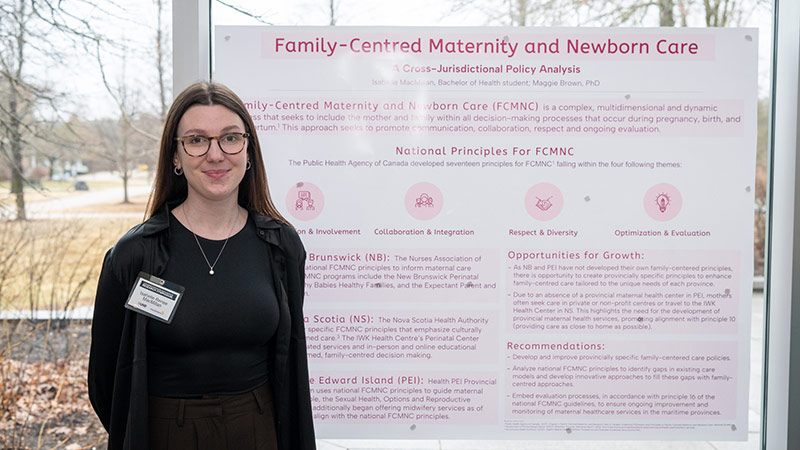Bachelor of Health graduates mark a four-year journey of interdisciplinary learning
Author: Alex Graham
Posted on May 10, 2024
Category: UNB Saint John

Students from the first full four-year cohort of the University of New Brunswick (UNB) innovative bachelor of health program are now ready to bring their interdisciplinary perspective to the field of health care, at home and beyond.
“The bachelor of health doesn’t sit inside one faculty,” said Dr. Lisa Best, associate dean of integrated health which includes the unique program. The bachelor of health program draws from the faculties of arts, business and science, and applied science and engineering.
“It’s outside of all three faculties, which means the content for the program was informed by all three,” she said.
“In Saint John there’s been a real focus on health research,” Best continued, citing the opening of the Dalhousie Medicine New Brunswick program and the expertise vice president academic, Dr. Petra Hauf, brought to the table from her time at St. Francis Xavier University in Nova Scotia.
That focus helped inform the degree’s major in biomedical sciences and health, one of the three majors offered in the program.
The others, management and health, and society and health, are supported more by the business and psychology departments respectively. Each major exposes students to the others through coursework and all three are academically rigorous and aim to challenge students to achieve their best.
“There’s just such interest in it. Faculty wanted to contribute and the student interest has just been phenomenal!”
Five students, who had previous degrees, graduated from the program in 2023 after completing a shortened course load. The 14 students graduating this year entered the program without a previous degree and journeyed through the entire four-year process.
Isabelle MacMillan is a member of this first cohort. She started her academic career with a year of nursing studies but soon realized that she had a different calling. Graduating with a major in management, she said the interdisciplinary nature of the program was what made it stand out.
“People have told me, ‘It’s almost like you have two degrees because you are able to look at both sides of things’”.
“That interdisciplinary degree was really appealing. It covered all my interests on the biomedical side with the science courses and the management side with the business aspect. Also the society side, with the psychology and sociology aspect of it,” she said.
Bringing people with different areas of interest into one program provided a lot of opportunities for ideas to be shared.
“As we progressed as a cohort through the program, people who had picked the biomedical major, for example, had different viewpoints on group projects than someone like me, who was a management major,” she explained.
“We were able to learn from each other and it was a really cool, collaborative experience between students and faculty.”
One of the highlights of the program for MacMillan was the opportunity to participate in the inaugural AstraZeneca Integrated Health Initiative Research Symposium in Saint John in April.
She says in addition to being a great learning experience it was also an excellent networking event, one that opened her eyes to other professional opportunities after graduation.
“It was a really great opportunity, especially for the health students, to be able to meet all of those different health professionals,” she said.
“There were people from more research centred positions that were more tailored to the biomedical people; there were HR professionals that were more tailored towards the management graduates; and there were also people from, for example, New Brunswick Social Pediatrics that would be more tailored towards the society and health major.”
All of that, in addition to UNB students from both campuses, showcasing their own research projects and learning from each other.
“It was a really cool group of people to be around for a couple of days.”
Lydia Flanagan, another member of the first full four-year cohort, agreed that the symposium was a valuable part of her undergraduate experience in the program.
The biomedical major undertook research with a group of classmates along with Horizon Health Network and a paediatric neurologist to study the genetic etiologies of epilepsy, as part of the degree coursework.
“We did end up finding significant results, which we presented at the symposium” she said. “There was a physician there in the audience, and she told us that we should publish this as a paper.”
She said the experience throughout her degree shifted her perspective on where she thought she was headed with her career and opened up new possibilities.
“I had always told my parents that research is not for me. It sounds so boring,” Flanagan said. “Now I can honestly see myself doing some research. I really enjoyed it!”
Research, further study at the graduate level, or jumping right into the health care system in positions like patient advocate, are some of the career paths available to graduates of this degree.
University is about opening eyes to all the paths that academic interests could lead to, and Best says this first cohort has helped inform aspects highlighting the interdisciplinary nature of the program even more, for the cohorts to come.
“Those first-year students coming in from high school see health as biomedical health and biomedical science,” she said. “We learned that those first-year students really need to learn and see how the societal and the management majors can truly inform health.”
“We’ve changed how that first year looks a bit because of that,” Best said, noting that there are plans to bring in a practicum in health course for the new majors starting next year.
MacMillan agreed that being part of the first full cohort was a trailblazing experience she was proud to be a part of.
“It’s really rewarding to know that we are the ones that are paving the way for everyone that’s going to come after us.”
